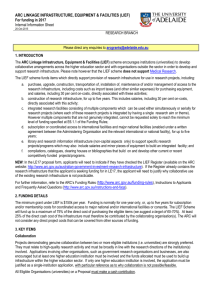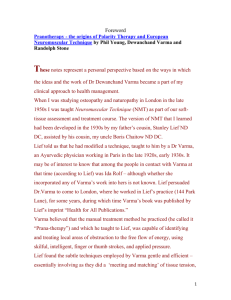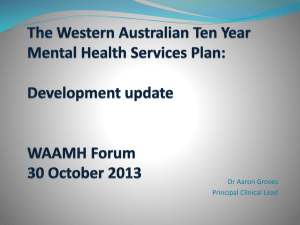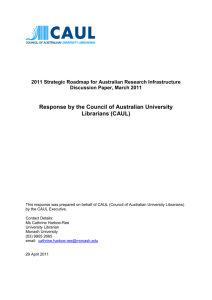Australian Research Council Consultation
advertisement
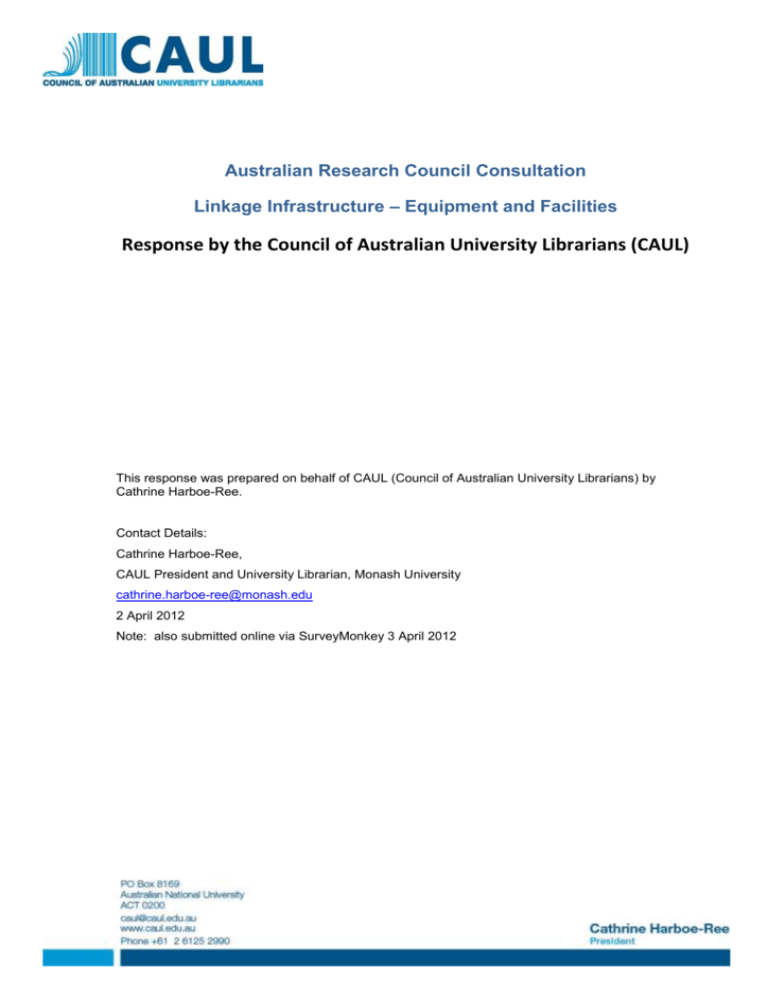
Australian Research Council Consultation Linkage Infrastructure – Equipment and Facilities Response by the Council of Australian University Librarians (CAUL) This response was prepared on behalf of CAUL (Council of Australian University Librarians) by Cathrine Harboe-Ree. Contact Details: Cathrine Harboe-Ree, CAUL President and University Librarian, Monash University cathrine.harboe-ree@monash.edu 2 April 2012 Note: also submitted online via SurveyMonkey 3 April 2012 Australian Research Council Consultation Linkage Infrastructure – Equipment and Facilities Consultation Questionnaire Purpose The ARC is currently considering changes to its Linkage Infrastructure – Equipment and Facilities (LIEF) scheme to: support a more strategic approach to investment in medium-scale research infrastructure; provide for better integration of LIEF objectives and funding with other Commonwealth research infrastructure programs; and establish a better balance of funding for infrastructure between research disciplines. Consultation To assist the ARC to develop its proposed improvements to LIEF, a consultation paper and this accompanying online questionnaire are being distributed to key stakeholders: higher education and other institutions that are eligible for funding under the scheme, Directors of ARC-funded research centres within those institutions, and other recent large infrastructure grant recipients. The ARC welcomes all comments. Please complete your questionnaire by Monday, 2 April 2012. Your responses will be treated in-confidence and are for internal use by the ARC as part of this consultation only. Should the ARC decide to disseminate or publish information obtained from responses to the questionnaire, it will only do so in a way that does not allow attribution of responses to individual respondents. The ARC will provide feedback to respondents, in summary form, about the outcomes from this consultation. 2 Questionnaire A more strategic approach to allocating funding See pages 3-4 in the Consultation Paper Q1 Would you support a two-stage process (expression of interest and full proposal) for identifying highpriority needs and assessing proposals for relatively large infrastructure to be funded from a portion of the LIEF budget? yes Q2 If a two-stage process were introduced, would you support it being guided closely by an assessment of strategic priorities for infrastructure at institutional, regional and national levels? yes Q3 Please provide any additional comment you may wish to make on the changes under consideration for a more strategic approach to allocating funding under LIEF. The Council of Australian University Librarians (CAUL) supports strengthening of several LIEF objectives, including more funding for the humanities and provision for funding technical experts. It is likely that both of these objectives would be better realised if a two-stage process were to be introduced, giving time for research teams to develop details of the research undertaking. CAUL supports this process for smaller projects as well, noting that many humanities projects will be smaller. Larger, multi-year grants See page 4 of the Consultation Paper Q4 Would you support a portion of the LIEF budget being used to fund larger grants? No comment 3 Q5 If larger grants were introduced, should there be an upper limit on the amount of funding that could be allocated to any such grant in any one year? No comment 4 Q6 If larger grants were introduced, should there be an upper limit on the portion of the LIEF budget used to fund them? (At present, the LIEF budget is about $30 million per annum.) Yes, otherwise it is likely that an even greater proportion of funding will go to the sciences. Q7 If larger grants were introduced, would you support multi-year funding being allocated to them? All grants – not commercial, not otherwise done. Especially note reference databases Q8 Please provide any additional comment you may wish to make on the changes under consideration for larger, multi-year grants. Many of the humanities projects that have been funded to date require multi-year funding. These have been important projects but they or may not have qualified as “large” projects. CAUL recommends that multi-year funding be considered for any project, with each project assessed on its merits. A better balance of funding between research disciplines See page 4 of the Consultation Paper Q9 Would you support a lowering of the minimum funding threshold for LIEF projects? (At present, the minimum level of funding provided by the ARC for a project under LIEF is $150,000 per year.) yes Q10 If the minimum funding threshold for LIEF projects were to be lowered, at what level should it be set per project, per year? no minimum threshold Q11 Would you support widening the scope of budget items supported under LIEF to include salaries for technical personnel necessary to develop and build specific items of infrastructure? yes 5 Q12 Please provide any additional comment you may wish to make on the changes under consideration for a better balance of funding between research disciplines. Many humanities projects, while important, are quite small and involve less collaboration than is likely in large-scale science research. Smaller projects should encourage humanities collaboration. Scheme performance See page 5 of the Consultation Paper Q13 Please comment on any aspects of the ARC’s current management and administration of LIEF which you believe could be changed to improve the scheme’s efficiency and effectiveness. CAUL has three main areas of interest regarding this review of LIEF grants. These are: the ARC's stated goal to increase the amount that goes to the humanities; the possibility that funding could be made available for technical experts; and; the desirability of greater complementarity between research infrastructure and LIEF grants. Specific comments follow: 1. Funding to the humanities 1.1 Lowering the minimum funding threshold may make a difference, but a bigger problem may be the requirement that LIEF funding be used for collaborative projects. If there are ways to encourage and fund smaller collaborative projects that could be beneficial. This might be more likely if the minimum funding threshold were to be lowered. 1.2 One of the most critical issues for the humanities is the need to digitise research collections and to manage the digital output of research. This has been raised through reviews of NCRIS but remains an area largely unfunded in Australia (in comparison with many overseas countries, where digitisation programs are extensively funded). It would be helpful if the list of budget items supported specifically included digitisation. CAUL suggests that any digitisation funded through LIEF would need to be transformational, meaning that the digitisation must be necessary to enable new research methodologies or to enable research outcomes that it would not be possible to achieve with non-digitised materials. There should be evidence that the digitised materials would be data collections of significance, and they should be digitised and made available in ways that support the use of tools and techniques such as text mining and other kinds of computer-assisted processing, and integration with other collections and inclusion in virtual research environments. 2. Technical experts This is critically important and should be 6 supported. Generally speaking research teams do not have the expertise to manage research workflows and research data, and so inclusion of provision for this would make a huge difference to research projects. CAUL would like to see included in this area expertise in research data management, information management (such as: rights management; deployment or development of standards, including digitisation standards; and curation, including management of retention and disposal regimes). CAUL also recognises the need for research workflow, user needs analysis, usabilty assessment, computational and software development expertise. 3. Complementarity between research infrastructure and LIEF grants CAUL would like to see support for greater linking between various Government funding programs, so that ARC LIEF grants favoured projects that involved working with NCI, RDSI, NeCTAR or ANDS, for example. This would help to optimise the investment in infrastructure as well as collaborative research, and would help ensure that standards and common tools were deployed as widely as possible. Respondent details Please enter your contact details. This information is required for validating responses. Name: Cathrine Harboe-Ree Position: President Institution: Council of Australian University Librarians (CAUL) City: Melbourne State: Victoria Postcode: 3800 Email: cathrine.harboe-ree@monash.edu Thank you for contributing to the ARC’s consultation on LIEF by responding to this questionnaire. 7

